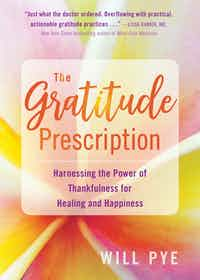By Will Pye, author of The Gratitude Prescription
As an opinionated teenager, I had thought I knew what depression was. When my older sister suffered, I thought she should essentially just get over it. I was ripe for humbling, and life did not disappoint. Soon after, in my early twenties, I suffered a prolonged depression so bleak, hopeless, dark, and incapacitating that I decided to end my life. I began crafting a note to my family, to ensure they did not suffer guilt or any sense of being responsible.
Fortunately, I found this task to be impossible. I scrapped the letter writing and resolved to transform my body, mind, and life. I believe the success I had in this endeavor, repeated as required when depression has reappeared, might be helpful for others.
According to the World Health Organization, 300 million people are affected by depression worldwide. Medication is a common response, yet meta-analyses have indicated that the common form of antidepressant medication, SSRIs, are ineffective for the vast majority of people. As with all medical research, there is great bias through selective reporting of studies (https://www.ncbi.nlm.nih.gov/pubmed/18199864). In addition, withdrawal can be a great challenge; initial efficacy typically wanes over time while side effects are varied and can be serious. Use rests on the common belief that depression is a consequence of faulty brain chemistry. Yet typically there is no test of neurochemistry at point of diagnosis or at any point during treatment. Without any such biomarker, the belief that depression is a consequence of faulty brain chemistry is surely just that, a belief. It may be helpful to question whether such a belief is helpful in creating the best long-term outcomes for people.
To regard depression as a physical illness is perhaps more helpful than regarding it as a character weakness—it creates more room for the compassion and understanding that was lacking in my youthful ignorance. Of course, experiences in consciousness have a physiological correlate in the neurology of head, heart, and gut. Yet does the brain chemistry cause the experience in consciousness or vice versa? The belief system of ontological materialism supports the profitability of the health care industry, the third largest cause of human death upon the planet[DB1] (first if you include outpatient iatrogenic deaths—https://www.globalresearch.ca/drug-induced-iatrogenic-disorders-the-third-leading-cause-of-death-in-the-us-and-britain/5626283), and emphasizes brain chemistry causing experience. It is helpful to also recognize the power of causation within our experience of consciousness, choices, and attention. Studies show meditation, yoga, smiling (even just the shape of a smile achieved via holding a pencil in the mouth for a period of time each day!) qigong, gratitude, and exercise cause benefits in well-being. I have found the practice of gratitude to be key. It has no known side effects nor is likely to form an unhealthy dependency. It is perhaps a necessary ingredient of well-being, like sleep, connection, and touch with other human beings, regular movement, and a nutritious diet.
Below are three phases of gratitude that can be experimented with. May your practice create well-being.
-
Appreciating the good—as Rick Hanson notes, our minds are like Teflon for the good and Velcro for the bad. A practice of deliberately giving attention to the good might be a necessary exercise to counter this tendency just as physical exercise is necessary to counter the tendency of muscle to waste. Try writing three things at night and three in the morning.
-
Appreciating the bad—once we have some familiarity with appreciating the good, we may try applying an alchemical ‘thank you’ to challenges and pains. I have found this to be effective in response to the experience of depression itself as well as to brain cancer, dissolving the suffering in each. In this experience we may realize the opportunity in depression for happiness through fully accepting and feeling physical and emotional pain. Just as light can only be realized in relation with darkness, we can learn self-love through experiencing self-loathing as resisting discomfort becomes embracing. This is the timeless journey from fear to love, soothing and balancing the fearful head brain with the loving heart brain.
-
Appreciating what you are—beyond good and bad thoughts, pleasant or unpleasant emotions and sensations—all objects of experience—is the pure subjectivity of all experience. Being. Presence. Awareness. A meditation practice that ripens beyond mere concentration or mindfulness can become this—a simple appreciating of our own presence, our own awareness, neither happy nor depressed, the joy of being.
So, what is depression? Faulty brain chemistry requiring medication or an opportunity for growth, learning, and discovery—an invitation to be and do differently? A chance to utilize the practices of gratitude, exercise, and more to create well-being and happiness by effecting your brain chemistry? Intriguingly, I find the latter perspectives to be less depressing. The choice is yours.
For a wealth of scientific research on gratitude and its practice, check out the Greater Good Science Center (https://greatergood.berkeley.edu/topic/gratitude) and my book, The Gratitude Prescription.
Will Pye is a visionary entrepreneur, transformational coach, and public speaker. Diagnosed with a potentially terminal brain tumor in 2011, Pye is no stranger to the healing power of gratitude, and is committed to helping others embrace thankfulness to transform their lives.



 2024 Peace Playbook: 3 Tactics to Avoid Clashes with Your Partner
2024 Peace Playbook: 3 Tactics to Avoid Clashes with Your Partner